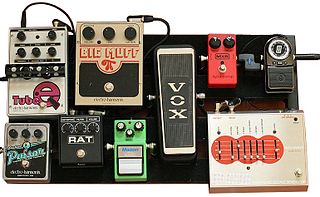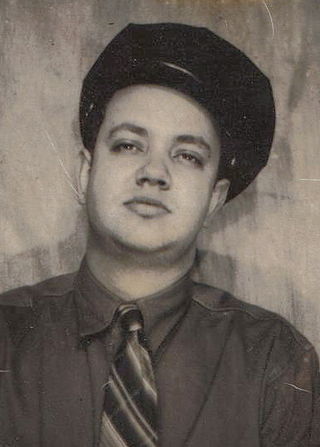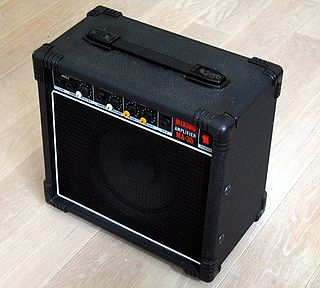
An effects unit, effects processor, or effects pedal is an electronic device that alters the sound of a musical instrument or other audio source through audio signal processing.

Vox is a British musical equipment manufacturer founded in 1957 by Thomas Walter Jennings in Dartford, Kent, England. The company is most famous for making the Vox AC30 guitar amplifier, used by The Beatles, The Rolling Stones, The Kinks, The Yardbirds, Queen, Dire Straits, U2, and Radiohead; the Vox Continental electric organ, the Vox wah-wah pedal used by Jimi Hendrix, and a series of innovative electric guitars and bass guitars. Since 1992, Vox has been owned by the Japanese electronics firm Korg.

An instrument amplifier is an electronic amplifier that converts the often barely audible or purely electronic signal of a musical instrument into a larger electronic signal to feed to a loudspeaker. An instrument amplifier is used with musical instruments such as an electric guitar, an electric bass, electric organ, electric piano, synthesizers and drum machine to convert the signal from the pickup or other sound source into an electronic signal that has enough power, produced by a power amplifier, to drive one or more loudspeaker that can be heard by the performers and audience.

A guitar amplifier is an electronic device or system that strengthens the electrical signal from a pickup on an electric guitar, bass guitar, or acoustic guitar so that it can produce sound through one or more loudspeakers, which are typically housed in a wooden cabinet. A guitar amplifier may be a standalone wood or metal cabinet that contains only the power amplifier circuits, requiring the use of a separate speaker cabinet–or it may be a combo amplifier, which contains both the amplifier and one or more speakers in a wooden cabinet. There is a wide range of sizes and power ratings for guitar amplifiers, from small, lightweight practice amplifiers with a single 6-inch speaker and a 10-watt amp to heavy combo amps with four 10-inch or four 12-inch speakers and a 100-watt amplifier, which are loud enough to use in a nightclub or bar performance.
Orange Amps is an English amplifier manufacturing company, noted for their products' distinctive sound and the bright orange Tolex-like covering of their heads and speaker cabinets. The company was founded in 1968 by Cliff Cooper, who decided to build his own amplifiers when vendors refused to supply his West End musical instrument store, Orange Store, due to Cooper's youth and countercultural image. Cooper also founded related companies, including the Orange record label in 1969.

Marshall Amplification is a British company that designs and manufactures music amplifiers and speaker cabinets. Founded in London by shop owner and drummer Jim Marshall, the company is based in Bletchley, Milton Keynes, England. Since March 2023, Marshall Amplification has been one of several divisions of the Swedish conglomerate, the Marshall Group.

Scholz Research & Development, Inc. was the name of the company founded by musician and engineer Tom Scholz to design and manufacture music technology products.

Electro-Harmonix is a New York City-based company that makes electronic audio processors and sells rebranded vacuum tubes. The company was founded by Mike Matthews in 1968. It is best known for a series of guitar effects pedals introduced in the 1970s and 1990s. EHX also made a line of guitars in the 1970s.

Kustom Amplification or Kustom Electronics is a manufacturer of guitar and bass amplifiers and PA equipment and accessories. Since 1999, Kustom has been owned by the Hanser Music Group headquartered in Cincinnati, Ohio.
A music store or musical instrument store is a retail business that sells musical instruments and related equipment and accessories. Some music stores sell additional services, such as music lessons, music instrument or equipment rental, or repair services.

Joseph Raymond Butts was an American inventor and engineer best known for designing several devices that influenced the evolution of electrified music, in particular those used with the electric guitar. Most notably, Butts is the inventor of the EchoSonic, a guitar amplifier with a built-in tape echo, and the FilterTron, the first humbucker guitar pickup. He was active in other fields from studio equipment maintenance to sound engineering, and had intimate working relationships with people such as Sam Phillips at Sun Studios and Chet Atkins.

A bass amplifier is a musical instrument electronic device that uses electrical power to make lower-pitched instruments such as the bass guitar or double bass loud enough to be heard by the performers and audience. Bass amps typically consist of a preamplifier, tone controls, a power amplifier and one or more loudspeakers ("drivers") in a cabinet.

The Echoplex is a tape delay effects unit, first made in 1959. Designed by engineer Mike Battle, the Echoplex set a standard for the effect in the 1960s; according to Michael Dregni, it is still regarded as "the standard by which everything else is measured." Used by some of the most notable electric guitar players of the 1960s and 1970s, original Echoplexes are highly sought after.

Distortion and overdrive are forms of audio signal processing used to alter the sound of amplified electric musical instruments, usually by increasing their gain, producing a "fuzzy", "growling", or "gritty" tone. Distortion is most commonly used with the electric guitar, but may also be used with other electric instruments such as electric bass, electric piano, synthesizer and Hammond organ. Guitarists playing electric blues originally obtained an overdriven sound by turning up their vacuum tube-powered guitar amplifiers to high volumes, which caused the signal to distort. While overdriven tube amps are still used to obtain overdrive, especially in genres like blues and rockabilly, a number of other ways to produce distortion have been developed since the 1960s, such as distortion effect pedals. The growling tone of a distorted electric guitar is a key part of many genres, including blues and many rock music genres, notably hard rock, punk rock, hardcore punk, acid rock, grunge and heavy metal music, while the use of distorted bass has been essential in a genre of hip hop music and alternative hip hop known as "SoundCloud rap".
Charlie Watkins was a British musician, inventor, and entrepreneur best known as the founder of Watkins Electric Music and a pioneer of sound reinforcement systems for rock concerts. Watkins was the first to build PA systems with multiple slaved solid state amplifiers driving various loudspeaker stacks, beginning with the Windsor Festival in 1967.

This is a glossary of jazz and popular music terms that are likely to be encountered in printed popular music songbooks, fake books and vocal scores, big band scores, jazz, and rock concert reviews, and album liner notes. This glossary includes terms for musical instruments, playing or singing techniques, amplifiers, effects units, sound reinforcement equipment, and recording gear and techniques which are widely used in jazz and popular music. Most of the terms are in English, but in some cases, terms from other languages are encountered.
The EchoSonic is a guitar amplifier made by Ray Butts. It was the first portable guitar amplifier with a built-in tape echo effect, and it allowed guitar players to use slapback echo, which dominated 1950s rock and roll guitar playing, on stage. He built the first one in 1953 and sold the second one to Chet Atkins in 1954. He built fewer than seventy of those amplifiers; one of them was bought by Sam Phillips and then used by Scotty Moore on every recording he made with Elvis Presley, from the 1955 hit song "Mystery Train" to the 1968 TV program Comeback Special. Deke Dickerson called the amplifier the Holy Grail of rockabilly music.

A keyboard amplifier is a powered electronic amplifier and loudspeaker in a speaker cabinet used for the amplification of electronic keyboard instruments. Keyboard amplifiers are distinct from other types of amplification systems such as guitar amplifiers due to the particular challenges associated with making keyboards sound louder on stage; namely, to provide solid low-frequency sound reproduction for the deep basslines that keyboards can play and crisp high-frequency sound for the high-register notes. Another difference between keyboard amplifiers and guitar/bass amplifiers is that keyboard amps are usually designed with a relatively flat frequency response and low distortion. In contrast, many guitar and bass amp designers purposely make their amplifiers modify the frequency response, typically to "roll-off" very high frequencies, and most rock and blues guitar amps, and since the 1980s and 1990s, even many bass amps are designed to add distortion or overdrive to the instrument tone.
Matamp is a British electric guitar amplifier manufacturing company, best known for its handwired amplifier heads and speaker cabinets. It was established in 1964 by Mat Mathias.
The Watkins Copicat is an effects unit that produces tape delay and reverb effects. One of the first commercially available tape delay units, the original Copicat model was produced by Watkins Electric Music beginning in 1958. The Copicat became one of Watkins' most successful products, and the company produced various Copicat models and versions over the following decades.















